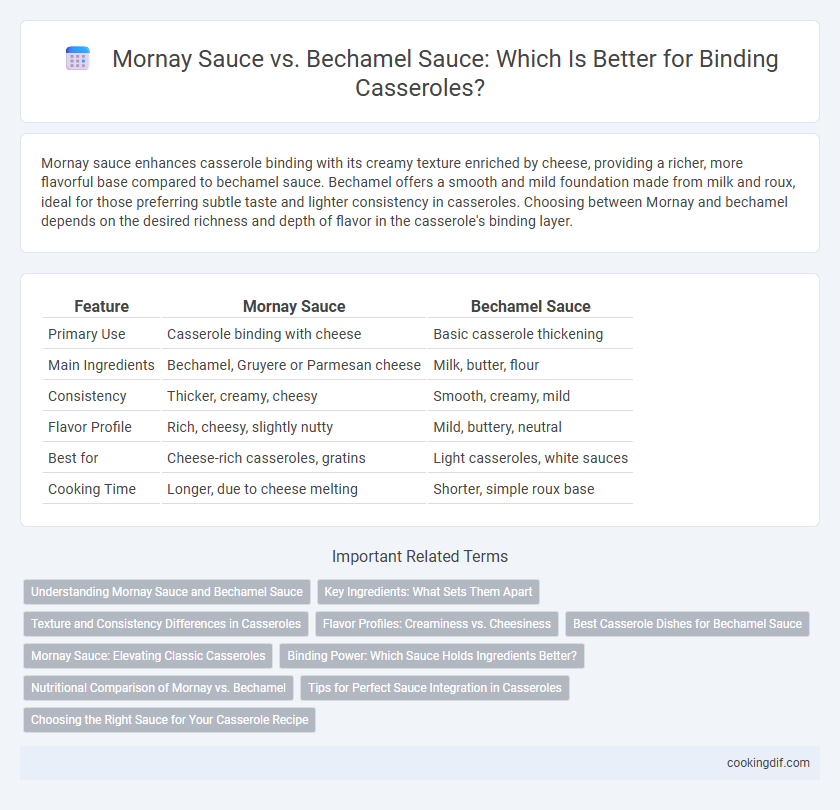Mornay sauce enhances casserole binding with its creamy texture enriched by cheese, providing a richer, more flavorful base compared to bechamel sauce. Bechamel offers a smooth and mild foundation made from milk and roux, ideal for those preferring subtle taste and lighter consistency in casseroles. Choosing between Mornay and bechamel depends on the desired richness and depth of flavor in the casserole's binding layer.
Table of Comparison
| Feature | Mornay Sauce | Bechamel Sauce |
|---|---|---|
| Primary Use | Casserole binding with cheese | Basic casserole thickening |
| Main Ingredients | Bechamel, Gruyere or Parmesan cheese | Milk, butter, flour |
| Consistency | Thicker, creamy, cheesy | Smooth, creamy, mild |
| Flavor Profile | Rich, cheesy, slightly nutty | Mild, buttery, neutral |
| Best for | Cheese-rich casseroles, gratins | Light casseroles, white sauces |
| Cooking Time | Longer, due to cheese melting | Shorter, simple roux base |
Understanding Mornay Sauce and Bechamel Sauce
Mornay sauce is a rich, creamy bechamel sauce enhanced with grated cheese, typically Gruyere or Parmesan, making it ideal for casseroles that require a flavorful, smooth binding agent. Bechamel sauce, a classic white sauce made from butter, flour, and milk, provides a simple, velvety base that thickens casseroles without adding strong flavors. Understanding the difference between these two sauces helps in selecting the right binder: bechamel offers creaminess and structure, while Mornay adds depth and a cheesy finish to baked dishes.
Key Ingredients: What Sets Them Apart
Mornay sauce differs from bechamel sauce by the addition of grated cheese, typically Gruyere or Parmesan, which imparts a rich, creamy texture and savory depth essential for binding casseroles. Bechamel sauce, a simple white sauce made from butter, flour, and milk, serves as a smooth, neutral base without the cheesy richness found in Mornay. This key ingredient variation makes Mornay more suited for casseroles requiring a robust, cheesy finish, while bechamel provides a lighter, velvety binder.
Texture and Consistency Differences in Casseroles
Mornay sauce, enriched with cheese, provides a creamier and thicker texture that enhances the body and richness of casseroles, creating a smooth, velvety consistency that binds ingredients effectively without becoming watery. Bechamel sauce offers a more neutral, lighter base with a moderately thick consistency, allowing the casserole's individual flavors to remain prominent while still providing sufficient creaminess. The choice between Mornay and Bechamel influences the casserole's final texture, with Mornay delivering a denser, more luscious mouthfeel and Bechamel contributing to a subtler, silkier binding effect.
Flavor Profiles: Creaminess vs. Cheesiness
Mornay sauce enhances casseroles with a rich, cheesy flavor profile derived from the addition of Gruyere or Parmesan cheese, providing a savory depth and creamy consistency that binds ingredients effectively. Bechamel sauce offers a smooth, velvety base with a subtle, buttery creaminess, emphasizing a mild dairy flavor that complements rather than overpowers the casserole's components. Choosing between Mornay and Bechamel impacts the final dish's taste, where Mornay brings pronounced cheesiness and Bechamel delivers understated creaminess for a balanced texture.
Best Casserole Dishes for Bechamel Sauce
Bechamel sauce, a classic white sauce made from butter, flour, and milk, provides a smooth and creamy base ideal for binding traditional casseroles such as lasagna, macaroni and cheese, and gratins. Its mild flavor enhances the texture without overpowering ingredients, making it perfect for layered dishes that require even heat distribution and a delicate finish. Mornay sauce, a richer variant with added cheese, suits casseroles where a more pronounced cheesy flavor is desired but may overshadow subtle flavors in lighter casseroles.
Mornay Sauce: Elevating Classic Casseroles
Mornay sauce, a rich bechamel variant enriched with grated cheese such as Gruyere or Parmesan, enhances casseroles by adding creamy texture and depth of flavor that bechamel alone lacks. This cheese-infused binding creates a luscious, golden crust when baked, elevating dishes like macaroni and cheese or vegetable gratins with its velvety, savory profile. Using Mornay sauce transforms classic casseroles into indulgent meals with a complex, satisfying taste that highlights the cheese's nutty and tangy notes.
Binding Power: Which Sauce Holds Ingredients Better?
Mornay sauce, enriched with cheese, provides superior binding power in casseroles compared to classic bechamel sauce due to the proteins and fat that create a thicker, creamier texture. Bechamel sauce, a simple white sauce made from roux and milk, offers a lighter consistency but can result in a looser hold of casserole ingredients. For a casserole that maintains its shape and has a rich mouthfeel, Mornay sauce is the preferred choice because of its enhanced adhesive qualities.
Nutritional Comparison of Mornay vs. Bechamel
Mornay sauce contains cheese, providing higher protein and calcium levels compared to the more basic bechamel sauce, which primarily consists of milk, butter, and flour. The added cheese in Mornay also increases fat and calorie content, making it richer but less suitable for low-fat diets. Bechamel offers a lighter option with fewer calories and saturated fats, ideal for casseroles requiring a less dense binding agent.
Tips for Perfect Sauce Integration in Casseroles
Mornay sauce, enriched with cheese, provides a richer, creamier binding for casseroles compared to basic Bechamel sauce, which is a simple roux-thickened milk base. To ensure perfect sauce integration in casseroles, whisk the sauce thoroughly to avoid lumps and gradually combine it with hot ingredients to maintain a smooth texture. Use a lower oven temperature to prevent the sauce from breaking or curdling during baking.
Choosing the Right Sauce for Your Casserole Recipe
Mornay sauce, enriched with grated cheese, adds a creamy, savory depth perfect for casseroles needing a rich, indulgent binding, while bechamel sauce offers a smooth, mild base that thickens and holds ingredients together without overpowering flavors. Selecting between Mornay and bechamel depends on the desired flavor intensity and texture--Mornay enhances dishes like gratins or vegetable bakes, whereas bechamel suits delicate casseroles requiring subtle creaminess. Both sauces provide excellent thickening, but Mornay's cheese content also contributes a golden, bubbly crust when baked, elevating presentation and taste.
Mornay Sauce vs Bechamel Sauce for casserole binding Infographic

 cookingdif.com
cookingdif.com